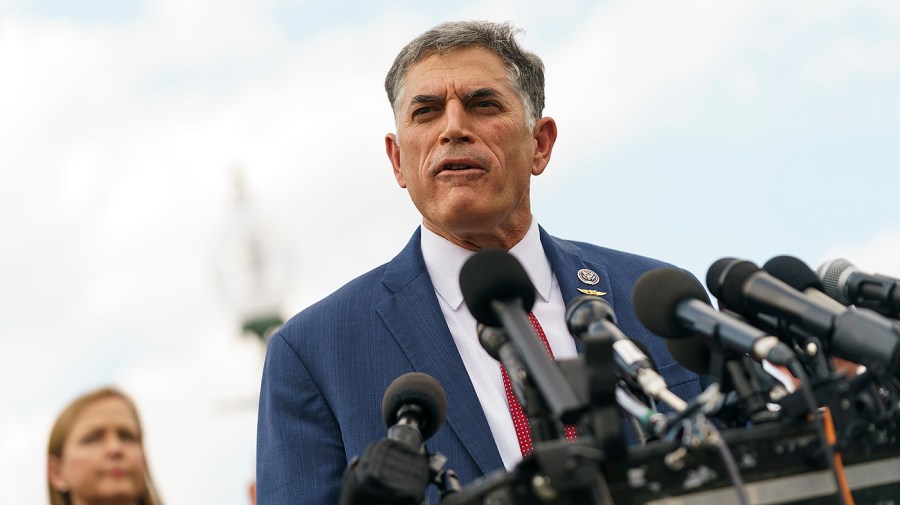Fallout rises from McCarthy handshake deal with White House
Lawmakers in both parties are growing increasingly concerned about where a handshake deal between the White House and former Speaker Kevin McCarthy (R-Calif.) on spending stands as they negotiate how the government should be funded next year.
The Biden administration and House GOP leadership worked to pass legislation known as the Fiscal Responsibility Act (FRA) in late spring as part of a larger deal to suspend the debt ceiling and set budget caps for Congress to work from when it hashes out its full-year funding bills months later.
But now that Congress is trying to ramp up its annual appropriations work, critical components of that months-old deal that were not reflected in the law are in question as ultraconservatives, in pursuit of steeper cuts amid climbing debt, say Speaker Mike Johnson (R-La.) is not beholden to what Democrats say is the full commitment made by McCarthy.
“A deal is a deal is a deal,” Sen. Brian Schatz (D-Hawaii), who serves on the Senate Appropriations Committee, said last week. “I think there’s no way we’re going to get to an appropriations deal if people can’t hold to their commitments.”
In a letter to Republicans this week, Johnson said the FRA remains “the law of the land” that “provides the framework” for spending talks as both chambers work to reach a top-line agreement for fiscal 2024 funding.
On paper, lawmakers agreed to a base discretionary spending cap of $1.59 trillion, or about $886 billion for defense spending and almost $704 billion for nondefense spending, for fiscal 2024. However, the White House at the time detailed other changes to pad funding on the nondefense side, including rescinding billions of dollars in IRS funding with the purpose of reinvesting it in nondefense programs.
The IRS got $80 billion in additional funding last year, to be spent over the subsequent decade, in the Biden administration’s Inflation Reduction Act (IRA), much to the consternation of Republicans. As part of debt ceiling negotiations, the sides agreed that a quarter of the money could be repurposed in annual appropriations.
Ten billion dollars would be taken away from the IRS for fiscal 2024 and another $10 billion for fiscal 2025, to be added to nondefense discretionary funds, White House officials said earlier this year.
“We didn’t get into the individual line items in this bill,” Office of Management and Budget (OMB) Director Shalanda Young said in May. But she said lawmakers would “use IRS rescissions from the IRA on the mandatory side.”
“Again, we don’t dictate how,” she said, “but they will rescind $10 billion both years, and they will then use that to be reinvested into non-defense discretionary.”
The total $80 billion would have generated $200 billion in revenue over the 10-year budget window for a net deficit reduction of $120 billion, according to the Congressional Budget Office. Back-of-the-envelope math suggests the repurposed $20 billion will add $30 billion to the deficit, provided it’s not spent in revenue-generating programs.
White House officials also noted plans to repurpose other rescissions from clawed-back coronavirus relief dollars, which they acknowledged are pulled back in the law.
But as funding talks pick up between leadership in both chambers, the House Freedom Caucus is dialing up the heat on Johnson to hold the line, demanding in a Friday letter that any deal on a top-line level for government funding for fiscal 2024 “significantly reduce total programmatic spending year-over-year.”
The group also called on lawmakers to reject “side deals, gimmicks, or any other mechanism designed to hide the true number.”
“I think it’s very important that we hold to [$1.59 trillion], which was what the FRA agreed to,” Rep. Andrew Clyde (R-Ga.), a member of the House Freedom Caucus who is also an appropriator, said this week. “I mean, everybody voted for it. If we don’t do that, then I think that’s a problem.”

Rep. Andrew Clyde (R-Ga.) speaks during a press conference with members of the House Freedom Caucus and outside groups to discuss government funding on Tuesday, September 12, 2023. (Greg Nash)
But Democrats and advocates are sounding alarm over the push.
Rep. Pramila Jayapal (D-Wash.), head of the Progressive Caucus, told The Hill last week that she’s “very” concerned about the potential cuts. “It has to be the whole deal.”
Sen. Jeanne Shaheen (D-N.H.) — whose subcommittee crafts the annual funding bill for the departments of Commerce, Justice and other agencies — also accused Republicans of “reneging,” adding the potential funding changes on the nondefense side make a difference for her subcommittee.
With the side deal included, Michael Linden, a former OMB official who was part of Biden’s negotiating team that hashed out the debt ceiling deal, argued the overall agreement would provide a “small increase” on the defense side and “flat-fund nondefense spending — which is a real cut, because costs go up every year.”
“That itself was a concession — a big concession — made in the service of avoiding exactly this kind of ridiculous back-and-forth, this procedural rigamarole, and just having Congress pass normal appropriations bills, which is what Republicans said they wanted,” he said in a Thursday interview.
Joel Friedman, senior vice president of federal fiscal policy at the Center on Budget and Policy Priorities, said the handshake agreement could fetch negotiators north of $60 billion in extra funding that could be redirected to the nondefense side.
“The only way you can get a freeze for nondefense is with the $69 billion in side deals,” he argued. “If you didn’t have that, it would have been a 9 percent in nondefense programs.”
“If it were a 9 percent cut, the White House wouldn’t have signed on. Senate Democrats and House Democrats wouldn’t have signed onto the deal. They wouldn’t have been able to reach agreement,” he said.
Copyright 2023 Nexstar Media Inc. All rights reserved. This material may not be published, broadcast, rewritten, or redistributed. Regular the hill posts







